Business management systems, which are designed to support strategic decision-making by managing resources across client, service, and organizational perspectives, collecting performance data, and analyzing profitability, have evolved through Data-Driven Analytics (DDA).
Recently, AI analytics tools have enabled proactive analyses, such as performance simulation, cost forecasting, and financial risk management, by leveraging years of accumulated data. In addition, generative AI technology is revolutionizing management data analysis by facilitating intuitive Q&A-style interactions and dramatically reducing the extensive manual tasks once required for data processing. These innovations empower businesses to make better-informed decisions and strengthen their competitive edge.
With massive volumes of business data now accessible and real-time and data-driven analyses becoming a reality, executives can verify their organization's number leadership from multiple perspectives, assess the current landscape, and plan future strategies. However, they once faced challenges due to the manual effort required for data processing and producing countless reports. Today, thanks to AI, much of this burden is lifted, allowing teams to focus more on their core business management responsibilities. AI equips executives to make more strategic decisions by rapidly and accurately analyzing complex data. As a result, businesses are propelled toward a more efficient and innovative future.
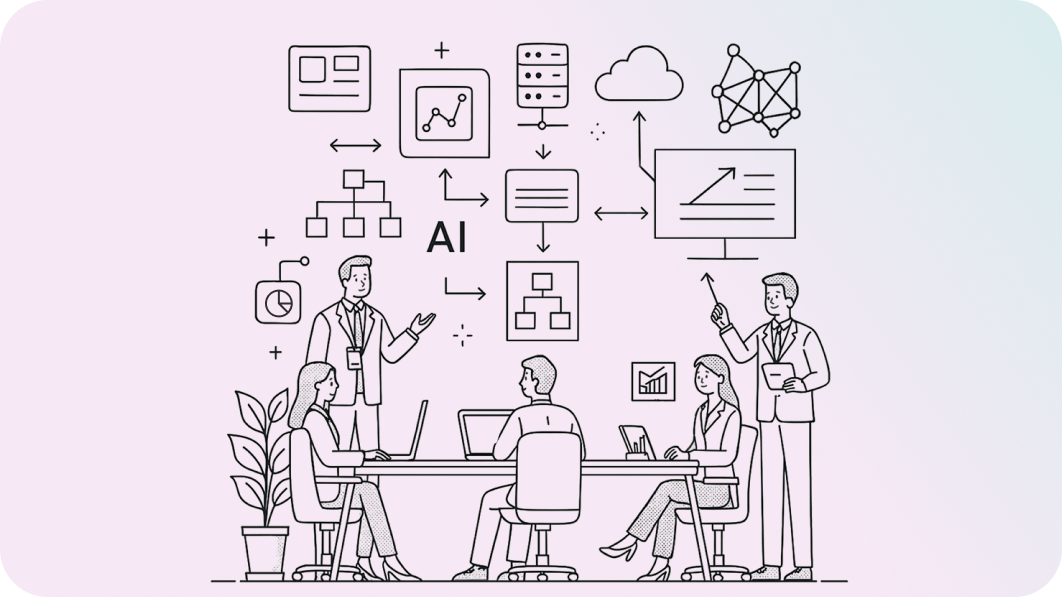
Consulting for Business Management Implementation, Diagnosis, and Improvement
Leveraging LG CNS's Process Innovation (PI) methodology and its expertise in operating business management systems across diverse industries, including electronics, manufacturing, chemicals, telecommunications, and services, we provide comprehensive diagnostics for business management systems and deliver optimal implementation strategies. Utilizing our AI Discovery for Business Management framework, we develop an AX adoption roadmap tailored to every business process while identifying key implementation tasks.

Business Management System Deployment
We deploy solutions optimized for each client's IT environment, ranging from robust business data databases to a business management system built around the Plan-Do-See (Plan, Execute, Feedback) paradigm. We support the advancement of business management systems by integrating AI for system enhancements and by deploying intelligent dashboard systems powered by generative BI.
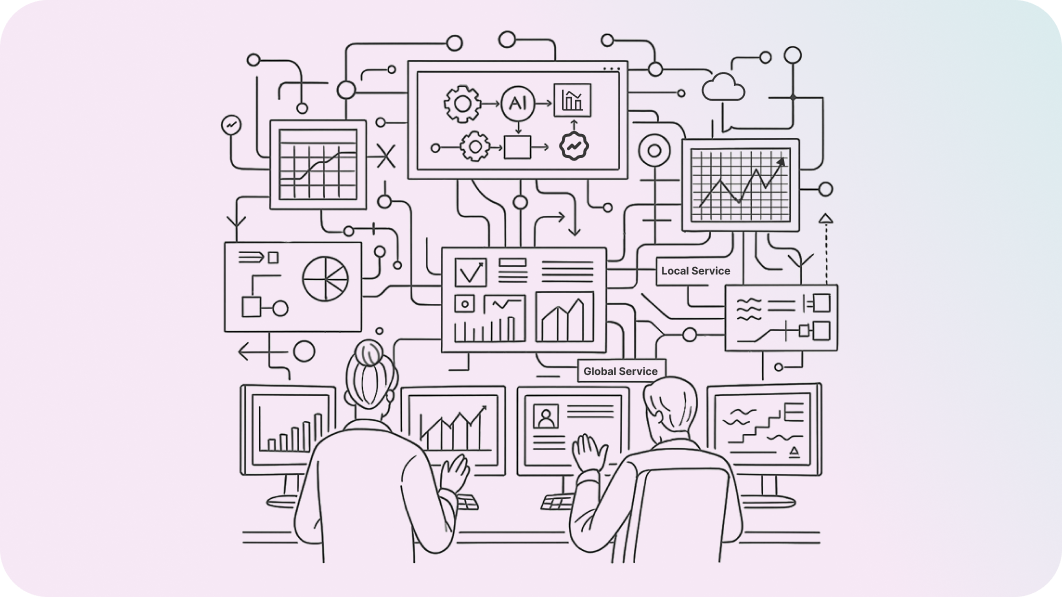
Business Management System Operation
Built upon LG CNS's enterprise-wide quality support framework, our services offer reliability across both global and local scales. Clients benefit from high-quality operational services underpinned by system management based on internationally recognized platforms, proactive fault detection, and optimal incident response.
-
Before deployment, it is crucial to strategize on consolidating dispersed business data, pinpoint which data areas require analysis, and determine how to capture any additional data. This is essential because a business management system leverages numbers from a multitude of in-house systems to drive informed strategic decision-making. Moreover, it is vital to design the system's functionalities and interfaces to align with its intended users, whether C-level executives or the entire organization.
-
Continuous improvement requires maintaining a dedicated team closely integrated with business units, one that not only handles routine business management tasks but also focuses on keeping data current and expanding analytical capabilities through system upgrades.
In the realm of business intelligence, digitalizing existing reports for ongoing monitoring is crucial. Automating routine manual reporting minimizes repetitive tasks, thereby enabling a focus on core management objectives such as maximizing profitability and improving resource utilization efficiency. LG CNS delivers expert guidance on system reengineering and digital transformation, empowering businesses to achieve a more strategic approach to business management.
LG CNS's SPACE-N is an optimized GIS solution that provides an integrated single-view interface for comprehensive monitoring of all facility management information at a glance. Designed with industry-specific functionalities for telecommunications, gas, and power, it flexibly adapts to diverse requirements by enabling one-click access to facility status and management tasks, simplifying complex work processes. Seamlessly integrating with clients' existing systems, SPACE‑N delivers stable operations from day one, while its cost‑effective structure reduces both implementation and operational burdens. Experience the new standard in GIS-based facility management with LG CNS SPACE‑N.

Hyper‑Personalized Widget-Based Dashboard
Offering a consistent user experience across both PC and mobile, our solution empowers users to customize their business widgets according to individual needs. It delivers real-time visualizations of key work statuses and critical indicators to support swift and accurate decision-making. With responsive charts and graphics, users can effortlessly access information whether they are in the field or at the office, while a personalized dashboard boosts workplace productivity by providing essential data at a glance. An intuitive, flexible interface further enhances efficient data management.
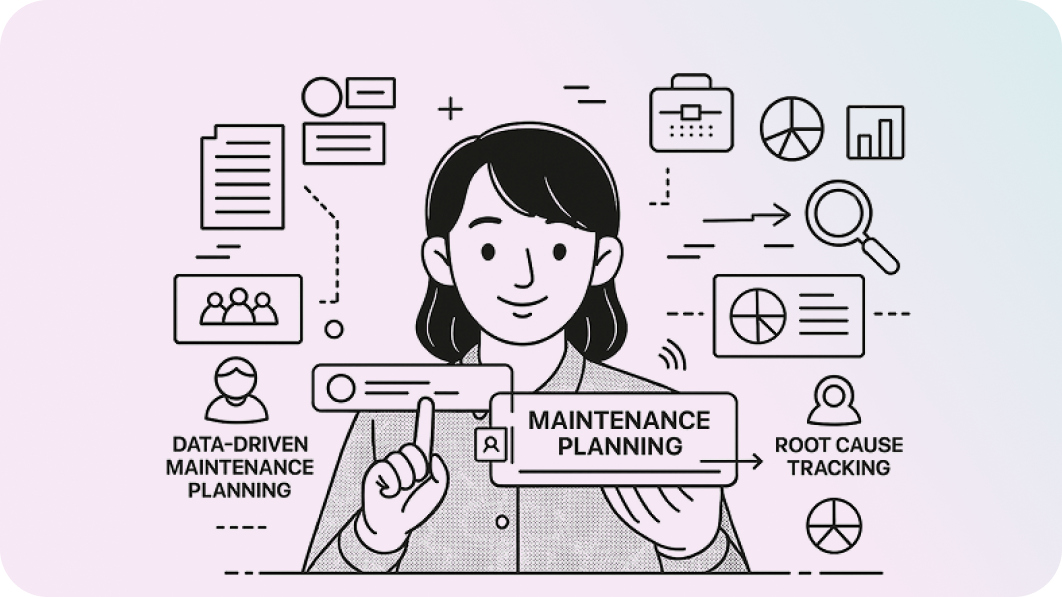
One‑Click Facility Information Searching and Management
This solution unifies facility data dispersed across multiple systems into one comprehensive platform. It maximizes management efficiency by providing easy access, from basic facility information to inspection and maintenance histories, on a single screen. By delivering a holistic view of the facility lifecycle, it enables data-driven maintenance planning and fault analysis. Eliminate unnecessary process steps and start managing facilities quickly and accurately with SPACE‑N.
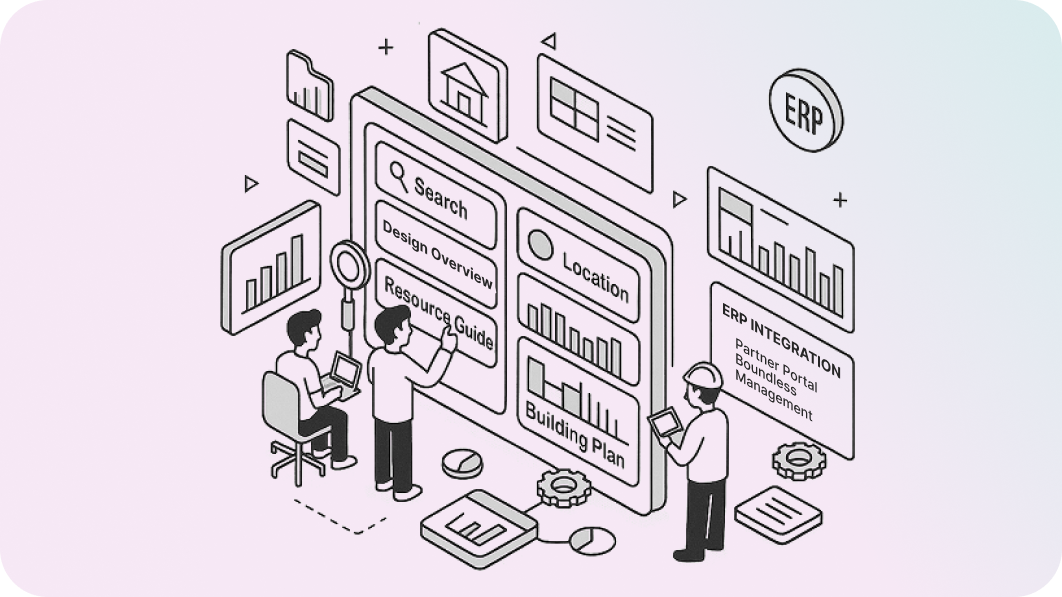
Innovative Construction Management
Our platform supports the execution of every phase, from design through completion, within a single, unified system. An intuitive drag-and-drop interface simplifies design tasks, while automated construction cost estimation and schedule management optimize operational efficiency. Visual monitoring of construction progress, combined with data connection from related systems such as ERP systems and partner portals, guarantees the consistency of construction data. It enables systematic and efficient management of the entire construction process.
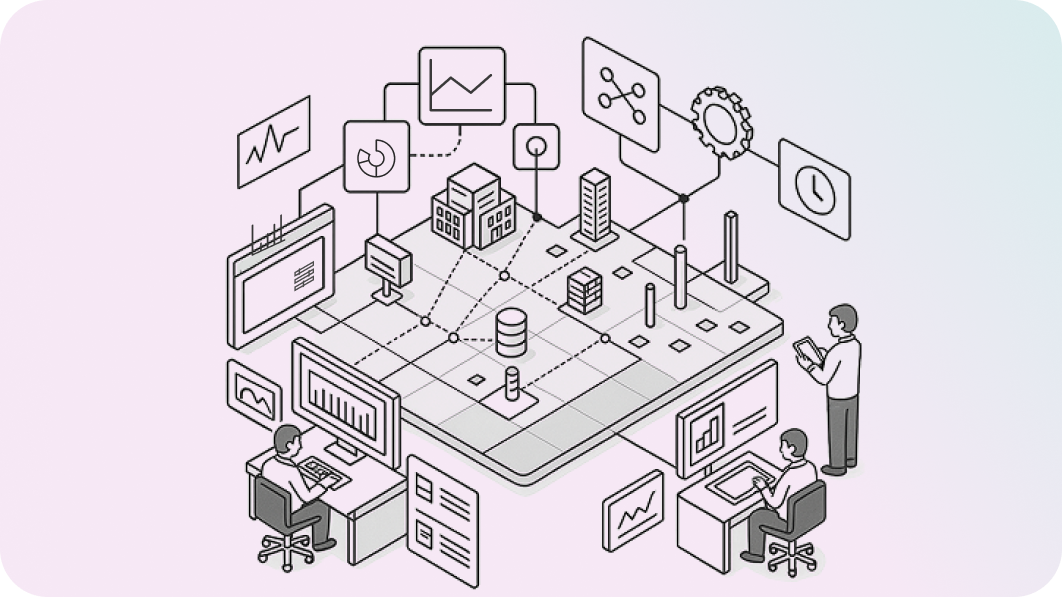
All‑in‑One Safety Management System
This system integrates facility safety assessment results onto a map, facilitating proactive risk identification. Leveraging external data sources enhances both the accuracy and efficiency of safety management and provides rapid root cause analysis and response protocols in emergencies. Comprehensive safety management data analysis enables accident prevention and follow-up measures, elevating a business's safety management standards with state-of-the-art technology.
-
SPACE‑N presents peak performance in core facility-driven sectors such as telecommunications, power, and gas. It is applicable across any industry where facility management, safety, construction, and operational efficiency are critical while its tailored features precisely address client needs. Along with industry-specific functionalities and flexible scalability, SPACE‑N supports reliable operations in a broad range of environments.
-
Given that a facility management system is integral for businesses with facilities across wide geographic areas, it is essential to ensure that the solution reflects operational processes and seamlessly connects with existing systems. Equally important is evaluating cost efficiency in the context of long-term operations. Businesses should examine the technical support framework and scalability from the outset.
-
SPACE‑N is fully customizable at deployment, and it also provides user-friendly administrative tools that allow on-the-fly modifications during operations. Whether you need to adjust facility configurations, update map data, or tailor dashboard screens, the intuitive interface facilitates ongoing workflow optimization.
-
Through a preliminary diagnosis, facility data is analyzed to determine if separate modernization and digitization efforts are necessary. Moreover, one of SPACE‑N’s key advantages is its simple design functionality, which minimizes discrepancies between the field and the system and continuously enhances data reliability.
-
After deployment, SPACE‑N offers continuous technical support and updates. Technical experts from LG CNS, Korea’s leading IT service provider, assist with initial onboarding and resolve operational issues, while regular software updates and new feature additions consistently enhance the solution’s performance.


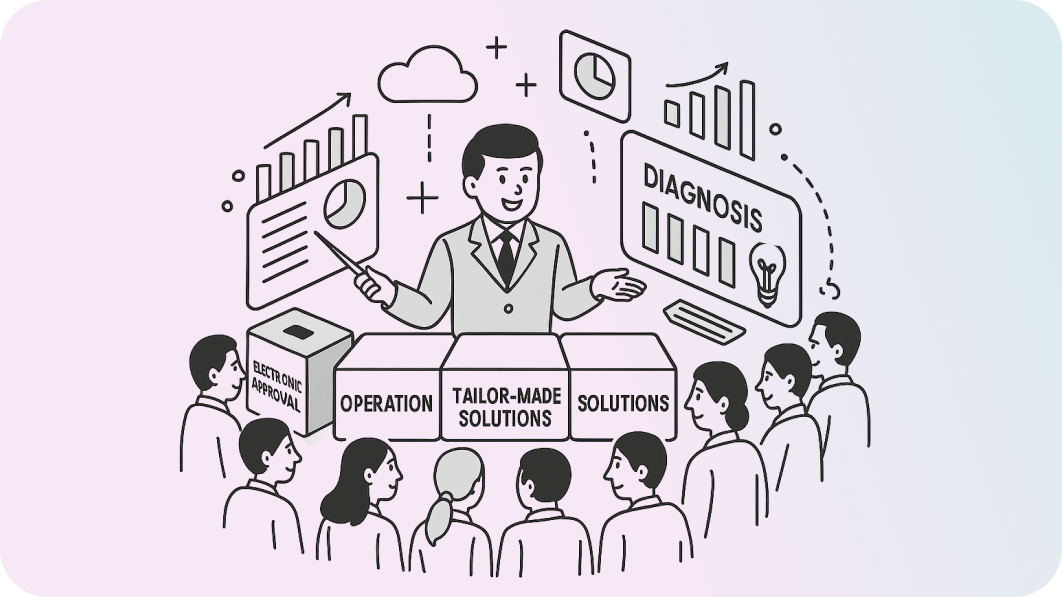
Expert Consulting Services for the Deployment, Diagnosis, and Enhancement of Management Support Systems
LG CNS accelerates the digital transformation of management support systems to maximize operational efficiency and business competitiveness. By thoroughly analyzing the business environments and requirements across a diverse range of industries, including electronics, manufacturing, chemicals, telecommunications, and services, we deliver customized solutions for critical functions such as electronic approvals, attendance management, general affairs support, legal support, procurement management, and asset management, ensuring the deployment of an optimized management support system tailored to each client's needs.

Deployment and Operation of Management Support Systems in Varied Environments
Leveraging decades of accumulated experience and expertise across multiple industries as well as our latest technologies based on cloud, AI, and RPA, we design and deploy optimized management support systems that are both scalable and robust, while guaranteeing smooth integration with existing legacy systems. Underpinned by a systematic project management methodology, we ensure strict adherence to timelines and budgets through meticulous planning and execution during the pre-deployment phase, while post-deployment, we fortify system stability and continuously improve performance with training, technical support, and performance monitoring.
-
To ensure business continuity, it is crucial to consider ways to integrate disparate business systems that have been implemented using different solutions and facilitate smooth information flow. An integrated system minimizes redundant tasks and maintains consistency across workflows. Additionally, the system should be flexibly scalable to accommodate a business's growth and changing needs. It should be designed for the addition of new features and integration with external systems, enabling timely adjustments in response to changing environments. This may also require transitioning to a different infrastructure environment, such as the cloud.
-
To enhance the user experience, it is vital to continuously collect and analyze employee feedback and assess system usability, making improvements to intuitive interfaces and functionalities as required. Moreover, increasing security with real-time monitoring and regular vulnerability assessments is essential for the stable operation of systems. For cloud-based systems, efficient management and optimization of cloud resources are critical to reducing costs and maximizing resource utilization.



